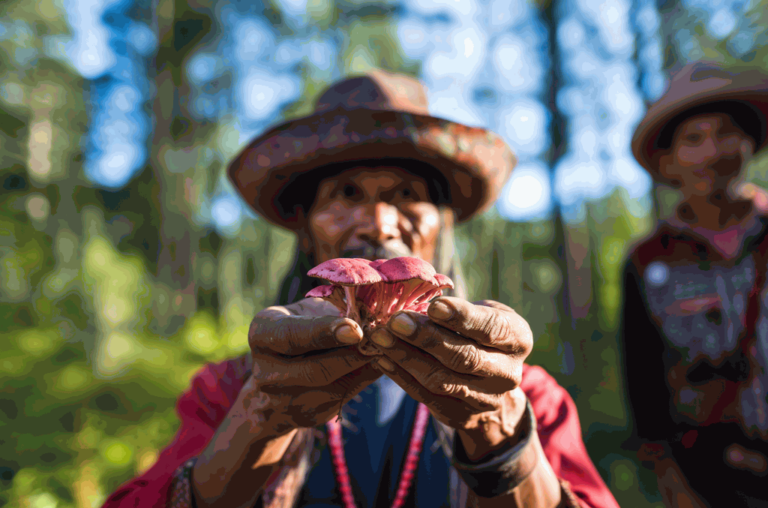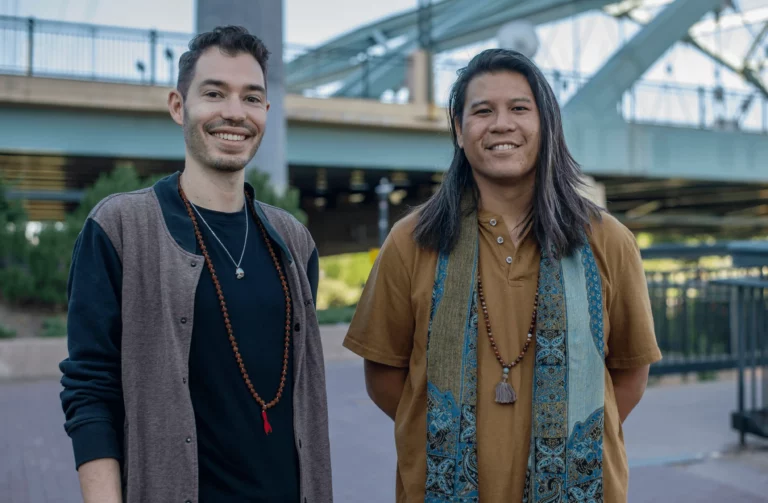Join us as we explore the fascinating world of psychedelic facilitation in Colorado. This article is inspired by our insightful podcast episode hosted by Psychedelic Passage co-founder, Jimmy Nguyen, which you can listen to on all streaming platforms.
Jimmy welcomes special guest Matthew Duffy, known as Duffy, an eco-futurist, mycopoet, and Theresian team player. Duffy shares his insights on the evolving landscape of psychedelics, from his involvement in the Decriminalize Denver Initiative to the birth of the Natural Medicine Health Act.
Discover the importance of creating an economy of care, solidarity economics, and sacred economics, all while fostering community sovereignty in the psychedelic movement. This conversation delves deep into the mycelial way of interconnectedness, building responsible relationships and practices in the realm of psychedelic medicine.
Key Takeaways
- Economy of Care: The concept of an “economy of care,” suggests a shift from extractive economic models to regenerative exchanges within the psychedelic community. It encourages a focus on relationships, environmental sustainability, and the well-being of all living beings.
- Cultural Roots and Critiques: The importance of acknowledging cultural roots in psychedelic practices and the need for respectful engagement with indigenous communities, especially in the context of the Natural Medicine Health Act is stressed. Critiques of the Act for its rapid implementation without sufficient inclusion of indigenous voices are acknowledged.
- Community Sovereignty: The dichotomy of regulated versus decriminalized approaches is acknowledged, advocating for the cultivation of community sovereignty. Duffy stresses the importance of investing in communities, fostering responsiveness, and resilience in times of global upheaval.
- Psychedelic Passage: Your Psychedelic Concierge — The easy, legal way to find trustworthy psilocybin guides, facilitators and psychedelic-assisted therapy near you in the United States.
Download Our Free Psilocybin Sourcing Guide
For harm-reduction purposes, we provide links to online psilocybin vendors, local stores, delivery services, and spore vendors for growing your own medicine at home.
Duffy’s Evolving Role In Decriminalization
In 2018, Duffy became involved in organizing the Decriminalize Denver Initiative. This initiative, focused on psilocybin, paved the way for the subsequent Prop 122 ballot initiative, which later evolved into the Natural Medicine Health Act in Colorado.
Duffy’s involvement showcased his commitment to pushing the boundaries of psychedelic reform. Building on the momentum of the Decriminalize Denver Initiative, Duffy co-founded Spore, short for the Society for Psychedelic Outreach, Reform, and Education.
This organization became a beacon for those advocating responsible psychedelic use, outreach, and systemic reform. During his tenure as the co-ecosystem director at Spore for two years, Duffy actively contributed to shaping its mission and initiatives.
Duffy’s dedication to the psychedelic cause led him to pursue a master’s degree in resilient leadership from Naropa University. Armed with the knowledge and skills acquired, he emerged as a leader capable of navigating the complex and evolving landscape of psychedelic advocacy.
As part of the natural evolution of initiatives, Spore transitioned into the My Coalition. This transformation reflects Duffy’s vision of modeling mycelium—an underground network of fungal threads—to lay the foundation for regenerative cultures and transformative justice.
The My Coalition aims to foster responsible medicine stewardship and holistic psychedelic ecosystems, aligning with Duffy’s overarching goal of ecosystem transformation.
Currently serving on the board of the My Coalition, Duffy has transitioned into a more artful role within the psychedelic movement ecosystem.
His focus extends beyond specific initiatives, supporting a new wave of leadership and contributing to the broader paradigm shift within the psychedelic community.
Decriminalization and Its Ripple Effect
Duffy begins by clarifying the distinction between local decriminalization and broader state legislative changes.
Denver served as a pioneering city, being the first to decriminalize psychedelic plants and fungi since prohibition, opening the gateway for policy reform nationwide.
However, the journey from local decriminalization to the Natural Medicine Health Act in Colorado was not a linear progression. Duffy emphasized that Denver’s move sparked a wave of decriminalization, laying the groundwork for a broader shift in policies related to psychedelics.
Economy of Care and Solidarity Economics
In Colorado, full decriminalization entails the absence of penalties for possession, cultivation, and consumption of psychedelic substances.
Moreover, individuals can be compensated for support services, harm reduction, and facilitation, but the sale of psychedelic medicines remains prohibited. This creates a unique gray area, allowing for the emergence of what Duffy terms an “economy of care.”
“How do we create these webs, these networks of exchanges, which is basically what economy is, make that commerce not extractive when commodification of the medicine itself is not actually legal here?”
Duffy introduced the concept of an “economy of care,” emphasizing the need to shift from extractive economic models to those centered on regenerative, abundant exchanges.
He drew parallels with solidarity economics and sacred economics, a concept that comes from Charles Eisenstein, advocating for a value shift that prioritizes relationships, environmental sustainability, and the well-being of all living beings.
The term “Mycelial Way” encapsulates Duffy’s vision for a holistic approach to psychedelic economics.
Drawing inspiration from mycelium, the underground network of fungal threads that connects and nourishes ecosystems, Duffy envisions a decentralized, interconnected web of exchanges within the psychedelic community.
Cultural Roots and Medicine Work Within Economics
“There’s a kind of economics that predates humanity, that is just the exchange. Eco means home. The word economics literally means home management. So how are we taking care of our home?”
The design of our current economic and social systems are extractive in nature, and seem to have disconnected us culturally and spiritually from our ancestral lineages.
These systems within our society leave many people to struggle in the absence of their roots, leaving them to beg the question of who has the right to be a medicine worker.
We can prioritize the resourcing for rights of passage with medicine by fundamentally reorientating towards acknowledging and honoring the significance of these transitional experiences.
It calls for a deepening of relationships with indigenous communities, both locally and globally.
Duffy stresses the importance of tending to relationships with indigenous peoples, recognizing their wisdom and contributions.
This becomes especially pertinent as Colorado embraces the Natural Medicine Health Act, which includes two psychedelic medicines derived from plants not endemic to the region.
The act incorporates Ibogaine, Mescaline, Peyote-derived substances, psilocybin, and DMT. Duffy points out the urgency of engaging in respectful and collaborative dialogue with indigenous communities associated with these medicines.
Critiques of the Natural Medicine Health Act
While the Natural Medicine Health Act marks a progressive step in decriminalizing psychedelic substances, it faces criticism for its rapid implementation without sufficient inclusion of indigenous voices.
Critics argue that the Act did not adequately involve or consult with indigenous peoples, particularly those directly connected to psychedelic medicines like Peyote.
“We’re in an interesting place because though the laws have kicked in now, the rulemaking is still happening. The policies and procedures of implementation are still happening.”
The ongoing rulemaking process provides an opportunity to address these concerns and ensure a more inclusive and culturally sensitive approach.
Community Sovereignty
A critical point raised by Duffy is the juxtaposition of regulated versus decriminalized approaches. He challenges the assumption that communities don’t regulate themselves, emphasizing the importance of cultivating community sovereignty.
This involves building the capacity to regulate within communities rather than relying solely on external, state-defined models.
Duffy critiques the convenience and consumerist culture that often accompanies these ready-made structures, stripping individuals and communities of their ability to steward themselves.
Duffy stresses the importance of investing in community, especially in times of upheaval, emphasizing the need for responsiveness and resilience as global challenges escalate.
In the face of global upheaval, Duffy calls for a radical participation in life—an active role in creating alternatives to a potentially suicidal trajectory. He emphasizes that community sovereignty is not about control but about radically participating in our lives.
Download Our Free Psilocybin Sourcing Guide
For harm-reduction purposes, we provide links to online psilocybin vendors, local stores, delivery services, and spore vendors for growing your own medicine at home.
Generational Work and Cultural Revival
Duffy delves into the generational work required to restore a sense of deep responsibility within communities. Drawing from his own experiences, he highlights the cultural roots of entitlement and injustice that have permeated society.
The current iteration of the psychedelic movement has the chance for a cultural revival instead of recreating the past, and seems to be well on its way.
“If you were doing psychedelics back in the 60s and 70s, you were a hippie or you were an anarchist. Now it’s different. Now there are state troopers, moms, doctors, therapists, politicians.
I heard the other day that there’s a sheriff’s department that was interested in providing ketamine-assisted therapy as an employee benefit. So there’s a culture shift there, as well.”
Set and Setting: A Collective Perspective
Duffy draws inspiration from Ido Hartogsohn’s book, “American Trip,” which reframes the well-known term “set and setting” from an individualistic perspective to a collective one.
Instead of viewing counterculture as a binary opposition to mainstream culture, Duffy suggests a composting approach. He envisions a cultural space where individuals don’t extricate themselves from the prevailing world but create vibrant, dynamic ecosystems at the intersection of cultures.
Reflecting on the deep-seated cultural conditioning that separates humans from nature, Duffy emphasizes the challenges of escaping this ingrained worldview.
Rather than striving for a utopian vacuum, he advocates for tending to the edges of culture, creating ecotones where interactions occur with communal understanding and practice.
“There’s this concept called an ecotone where two ecosystems meet, and in that middle is actually the most vibrant, dynamic, resilient part of the environment. And it’s really crucial that we tend to that space.”
Duffy acknowledges the generational work required to restore a communal understanding of self-actualization, countering the individualistic narrative prevalent in Western societies.
The cultural flip involves recognizing that self-actualization is a cultural given, not an individual pursuit. This shift encourages individuals to view themselves as integral parts of the communal fabric, dispelling the notion that personal growth exists in isolation.
The conversation extends to the potential harm in adopting a self-focused, egocentric approach to psychedelics. Duffy warns against the possibility of psychedelics being used to condition individuals to be more complacent within oppressive systems.
He emphasizes that true healing involves acknowledging and addressing the cultural, societal, and systemic issues that contribute to individual struggles.
Duffy encourages individuals to move beyond a prescriptive mindset and take personal agency and responsibility. The choices individuals make in their daily lives, relationships, and resource allocation contribute to shaping the culture around psychedelics.
More Psychedelic Passage
-
- Listen to our podcast on Spotify, Apple Podcasts, and iHeartRadio
-
- Subscribe to our Youtube Channel
More From Our Guest
Ready to Find a Trusted Psychedelic Therapy Provider Near You?
Hi there! We sincerely hope that you’ve found valuable takeaways that resonate with your current intentions. To explore research-based education, stay updated with psychedelic news, and benefit from practical how-to articles, we encourage you to head over to our resources page.
If you’re seeking personalized advice and are prepared to take the first step toward a therapeutic psychedelic experience, we invite you to book a consultation with our team of experienced psychedelic concierges.
This consultation is more than just a conversation; it’s an opportunity to be matched with a trustworthy local facilitator. You’ll be seamlessly connected to our rigorously vetted network of psychedelic guides, ensuring potential matches align with your needs.
Psychedelic Passage offers confidence and peace of mind by alleviating the burden of having to guess who’s right for you. If you want to discover how Psychedelic Passage can help you, we empower you to learn more about our services and check out client testimonials from those who’ve gone before you.
Your healing path is uniquely yours, and our commitment is to serve you at every juncture. Psychedelic Passage: Your Psychedelic Concierge — The easy, legal way to find trustworthy psilocybin guides, facilitators and psychedelic assisted therapy near you in the United States.
Learn More About Our Network
Frequently Asked Questions
1. What is the “economy of care” concept introduced by Duffy?
Duffy introduces the idea of an “economy of care” within the psychedelic community, emphasizing a shift from extractive economic models to regenerative exchanges.
This concept centers around values like relationship-building, environmental sustainability, and the well-being of all individuals involved, aligning with principles of solidarity economics.
2. How does the Natural Medicine Health Act in Colorado incorporate psychedelic substances, and what criticisms does it face?
The Natural Medicine Health Act in Colorado decriminalizes psychedelic substances, allowing for the absence of penalties related to their possession, cultivation, and consumption.
However, it faces criticism for its rapid implementation without sufficient inclusion of indigenous voices, especially those connected to psychedelic medicines like Peyote.
3. What does “community sovereignty” mean in the context of psychedelic advocacy?
“Community sovereignty” challenges the regulated versus decriminalized dichotomy, advocating for communities to cultivate the capacity to regulate themselves. Duffy stresses the importance of investing in communities, fostering responsiveness, and building resilience in the face of global challenges.
4. How does Duffy envision the “Mycelial Way” in the context of psychedelic economics?
Inspired by mycelium, the underground network of fungal threads, Duffy envisions the “Mycelial Way” as a decentralized, interconnected web of exchanges within the psychedelic community.
This concept promotes a holistic approach to psychedelic economics, emphasizing interconnectedness and collaboration.
5. What cultural shift does Duffy propose in the psychedelic movement, inspired by Ido Hartogsohn’s perspective?
Duffy draws inspiration from Ido Hartogsohn’s book, “American Trip,” and suggests a cultural shift in the psychedelic movement. Rather than viewing counterculture as a binary opposition to mainstream culture, he proposes a composting approach.
This involves creating vibrant, dynamic ecosystems at the intersection of cultures, moving away from the Western worldview of complete separation.



